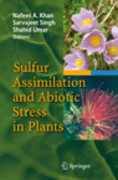
Sulfur is one of the four major essential elements necessary for the plant life cycle. Its assimilation in higher plants and its reduction in metabolicallyimportant sulfur compounds are crucial factors determining plant growth and vigor and resistance to stresses. The range of biological compounds that contain sulfur is wide. The information on sulfur assimilation can be exploited in tailoring for efficient sulfur utilization, and in the applied approaches for the sustenance of agricultural productivity through nutritional improvement andincreased stress tolerance. The present book discusses the aspects of sustainable crop production with sulfur, the importance of sulfur metabolites and sulfur metabolizing enzymes in abiotic stress management in plants. Most up-to-date reference on sulfur assimilation in plants INDICE: From the contents Responses to Sulfur Limitation in Maize.- Feasibility of Elemental S Fertilizers for Optimum Seed Yield and Quality of Canola in the Parkland Region of the Canadian Great Plains.- Impact of Sulphur on N2 Fixation of Legumes.- Sulphur Nutrition and Assimilation in Crop Plant.- Regulatory Protein-Protein Interactions in Primary Metabolism: The Case of the Cysteine Synthase Complex.- Glutathione Reductase: A Putative Redox Regulatory System in Plant Cells.- Sulfotransferases and their Role in Glucosinolate Biosynthesis.- Response of Photosynthetic Organelle to Abiotic Stress: Modulation by Sulfur Metabolism.- Modified Levels of Cysteine affect Glutathione Metabolism in Plant Cells.- Role of Glutathione in Abiotic Stress Tolerance.- Recent Advances in Understanding of Plant Responses to Excess Metals: Exposure, Accumulation and Tolerance.
- ISBN: 978-3-540-76325-3
- Editorial: Springer
- Encuadernacion: Cartoné
- Páginas: 380
- Fecha Publicación: 01/03/2008
- Nº Volúmenes: 1
- Idioma: Inglés
